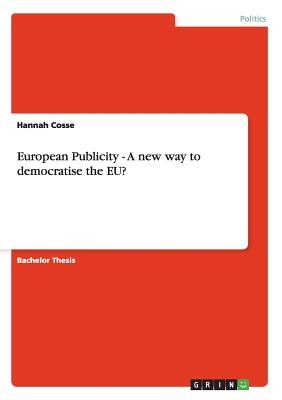
- We will send in 10–14 business days.
- Author: Hannah Cosse
- Publisher: GRIN Verlag
- Year: 2007
- Pages: 48
- ISBN-10: 3638670961
- ISBN-13: 9783638670968
- Format: 14.8 x 21 x 0.3 cm, softcover
- Language: English
- SAVE -10% with code: EXTRA
European Publicity - A new way to democratise the EU? (e-book) (used book) | bookbook.eu
Reviews
Description
Bachelor Thesis from the year 2005 in the subject Politics - Topic: European Union, grade: 2,0, University of Münster (Institut für Politikwissenschaft; Faculty for Business, Public Administration and Technology), course: Public Administration, language: English, abstract: I.1. Introduction and Problem Definition On its way from an economical partnership to a political union the EU has faced a long-time debate about its democratic deficits. Discussions and proposed remedies focused mainly on the institutional side of the problem and the ques-tion of how the institutions can be democratised. Since the 1990s the debate about European identity and citizenship attracted the limelight of the political debate within the European Union. However, this paper will neither focus on the institutional nor on the identity part of the debate about the democratic deficits of the EU, but will focus on a dimension in between. Direct democracy, as in the Greek city states, is, because of the size of modern democracies, not feasible anymore. The media is needed to communicate deci-sions (top-down) as well as the will of the people (bottom-up). (Mass-) media creates publicity. On a national level there is a network of print, TV and online media, which creates a tight arrangement of top-down and bottom-up communi-cation: national publicity. The European Union, with its multi-level-governance structures and the heterogeneous identities, is more complex than a nation state. European Publicity can be seen from two angles: In the first place European Publicity as "EU wide publicity" - which means Europe wide media and also a common communication-place for European topics from a huge variety of par-ticipants. From this angle the lack of "a common European Media" - although attempts like "Euronews" are a first step - could be analysed. Furthermore there is a language problem with regard to "EU wide publicity". Within the EU there is no common language; therefore there cannot be (at the moment
EXTRA 10 % discount with code: EXTRA
The promotion ends in 8d.20:47:36
The discount code is valid when purchasing from 10 €. Discounts do not stack.
- Author: Hannah Cosse
- Publisher: GRIN Verlag
- Year: 2007
- Pages: 48
- ISBN-10: 3638670961
- ISBN-13: 9783638670968
- Format: 14.8 x 21 x 0.3 cm, softcover
- Language: English English
Bachelor Thesis from the year 2005 in the subject Politics - Topic: European Union, grade: 2,0, University of Münster (Institut für Politikwissenschaft; Faculty for Business, Public Administration and Technology), course: Public Administration, language: English, abstract: I.1. Introduction and Problem Definition On its way from an economical partnership to a political union the EU has faced a long-time debate about its democratic deficits. Discussions and proposed remedies focused mainly on the institutional side of the problem and the ques-tion of how the institutions can be democratised. Since the 1990s the debate about European identity and citizenship attracted the limelight of the political debate within the European Union. However, this paper will neither focus on the institutional nor on the identity part of the debate about the democratic deficits of the EU, but will focus on a dimension in between. Direct democracy, as in the Greek city states, is, because of the size of modern democracies, not feasible anymore. The media is needed to communicate deci-sions (top-down) as well as the will of the people (bottom-up). (Mass-) media creates publicity. On a national level there is a network of print, TV and online media, which creates a tight arrangement of top-down and bottom-up communi-cation: national publicity. The European Union, with its multi-level-governance structures and the heterogeneous identities, is more complex than a nation state. European Publicity can be seen from two angles: In the first place European Publicity as "EU wide publicity" - which means Europe wide media and also a common communication-place for European topics from a huge variety of par-ticipants. From this angle the lack of "a common European Media" - although attempts like "Euronews" are a first step - could be analysed. Furthermore there is a language problem with regard to "EU wide publicity". Within the EU there is no common language; therefore there cannot be (at the moment


Reviews